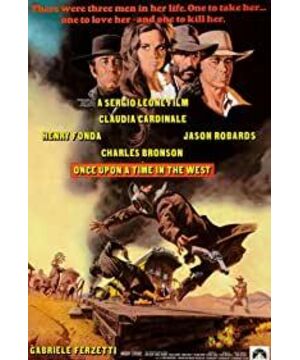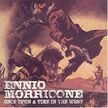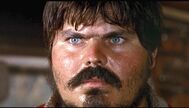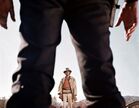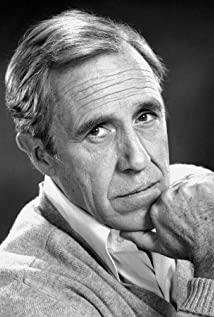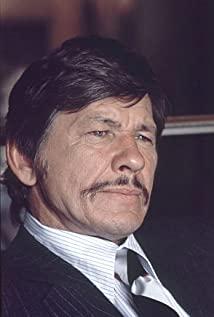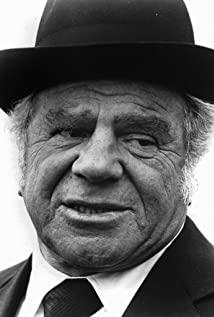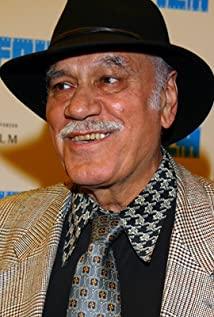In the last article, I think "Once Upon a Time in the West" is a masterpiece of American Western films. However, "Once Upon a Time in the West" in many aspects, especially in terms of narrative and filming techniques, did not follow the traditional "routine" of American Western films. It can be said that in form, "Once Upon a Time in the West" is still an Italian western film, and it is the pinnacle of Italian western films.
Leone was born in a movie family and grew up under the influence of movies, dramas, and operas. As an Italian and born into a family of literary arts, the Italian cultural blood flowing through Leonne can't be washed away. As a film creator, he is also very easy to bring such cultural DNA into his films.
When creating "Red Dead Redemption" (1964), Leone's personal style was not very prominent, he just mixed samurai films with westerns, and seemed to have found a "new" way of telling stories.
When we waited for "The Good for Dusk" (1965), we began to see the narrative of a kind of opera, and we began to see the unique sense of ritual in Leon's movies. In "The Good, the Bad and the Best" (1966), Lionel brought his opera-like narrative and his sense of ritual to lengthen time by repeatedly switching the camera to the fullest.
The extended version (175 minutes, Italian version) of "Once Upon a Time in the West" is nearly three hours long. If such a story is filmed by a Chinese director, such as Zhang Che, it may be able to tell the whole story in 90 to 100 minutes. The reason why Lionel was able to tell the story for almost three hours was that the narrative "ritual" and the "ritual" of the camera at least added an hour to the film.
In Western films, the sandy environment and the dusty people give us a primitive and rough feeling. However, when I watched "Once Upon a Time in the West", I felt elegance, because Leonne's light-lifting, leisurely and self-satisfied talk brought the opera-like elegance of the film. Therefore, I say "Once Upon a Time in the West" is an elegant and crude Italian opera.
American Western films, Chinese martial arts films, and Japanese samurai films are often regarded as men’s movies. Cowboy dreams, knight dreams, and samurai dreams are also the dreams of many men. Therefore, in these types of movies, there are relatively few female roles. In Leone's "The Red Dead Trilogy", although there are also female characters, the female characters are insignificant supporting roles, and no female character plays a very important role in the whole story. Even in Leoné's works before the "Fistful of Dollars", there is no female role to play the leading role.
Some people therefore questioned whether Leone despised women. Leone said: "There are three strong women in my family, Carla, Rafaela and Francesca (Leone’s wife and two daughters). That's the reason!" Leon's wife, Carla, also said: "In his life, women play a very important role, so in his movies, he can't just use them as props."
Yes, you can’t use a female character as a prop in the movie. If you want to use it, let her be the core of the whole movie! Therefore, in "Once Upon a Time in the West", we saw a very important female character, Jill, a prostitute from New Orleans. She is the widow of Brett McBain and will become a member of the rich town of "Sweet Water Town". Owner. The four main male characters in the film, the lonely avenger, the romantic bandit, the cold-blooded villain, and the unscrupulous businessman, have forged an indissoluble bond with her. The first two are her left and right guardians; the latter two are her predators; and she is the ultimate "victor".
Jill’s femininity and motherhood seem to be incompatible with the barbaric western world, but it is precisely her existence that makes the west become the west—she is the dream of almost all men, and she is a virgin existence in the western world. . Before he died, Robber Xia Yan said two classic lines to Jill. He looked at the hot workers outside the door and said: "You should give them water to drink, how happy they will see you!" At the end of the film, Jill brought water out of the house and gave the workers a drink, just like the workers. The rain is like rain and dew. Xia Yan also said: "If someone wants to pat your butt, you just pretend that nothing happened, that is what he deserves." Before leaving, Xia Yan patted Ji Er's butt, and Ji Er also tacitly agreed. Let Xia Yan get what he "deserves."
This role is as important as any male character in the film, and he is, he is the end of the whole story, um. And she is the whole story, the vested interest or the winner of the entire West.
The appearance of Jill's role, Bernardo Bertolucci actually played a big role. In the process of creating the story, Bertolucci proposed a plan to introduce an important female character. Leonene did not agree at first, but after Bertolucci made the character more concrete and fuller, Leonene finally agreed to this. plan. Thus, Jill became one of the most important female characters in the history of Western films.
The introduction of Jill’s role seems to have revolutionized his own "fate", but in a sense, it has also revolutionized the "fate" of American Westerns, because in American Westerns, it is so important. Female roles are also very rare.
Although Leone has injected the "Western Spirit" into "Once Upon a Time in the West", the whole spiritual connotation of the film is quite different from that of traditional American Westerns. In most American Western films, justice and evil, black and white are quite distinct, and the films are often filled with a naive and optimistic spirit. However, in "Once Upon a Time in the West" we can't see an absolutely positive image. The lonely avenger "Harmonica" is the most "just" character in the film, but he saved Frank's life in order to slash his enemies. It can be described as wicked. "Harmonica" is at best compared to the "good guy" in "The Good, the Good, and the Good." There is still a big gap between Sheriff Will Kane in "Noon" (1952). At the end of the film, Cheyenne passed away and "Harmonica" left. This was not a happy ending. In traditional American Western films, optimism is more common, while Leonie's "Once Upon a Time in the West" has obvious The pessimistic color.
Leon's "rebellion" against the "American Spirit" or "Western Spirit" is also manifested in his choice of Henry Fonda to play Frank, the heinous villain. Henry Fonda is a very important star in the history of American cinema and one of the spokespersons of the "American Spirit". Before "Once Upon a Time in the West", Henry Fonda's roles were basically positive roles, such as the lawyer Lincoln in "Young Lincoln" (1939), the jury member in "Twelve Angry Men" (1957), etc. , These roles have set up a relatively "weiguangzheng" image for Henry Fonda. However, Leonie chose him to play a big villain, which is almost a big joke to the Americans-you see, the representatives of your "American spirit" have become a big villain in my movie. douchebag! Hahaha!
Although the lonely Avenger "Harmonica" is played by a white man, we can see from his image design and flashbacks of his youthful moments that he should be of Indian descent even if he is not Indian. Mixed race. Let an Indian become a sharpshooter, become the most powerful cowboy, which is almost absent in previous Westerns. This is also a "rebellion" by Leonie against American Western films, or a huge irony of the "American spirit". And this point was later inherited by Quentin Tarantino, who made the black man a sharpshooter in his "Jiang Ge Freed" (2012).
When Leon was creating "Once Upon a Time in the West", his serious attitude and playfulness coexisted. The three gunners who were killed by the "Harmonica" at the beginning are said to have wanted to invite major Western movies such as Clint Eastwood and Lee Van Cleef to appear. Aren’t you very good cowboys in westerns? I want you to be beaten to death at the beginning of "Once Upon a Time in the West". Leone tried to use this to create a "horror" effect, and at the same time ridiculed his previous works fiercely. It's a pity that the big guys think there are too few scenes, and Leon's wish has not been realized, otherwise, this will become a major feature of the film.
On the soundtrack, Lionel continued to collaborate with Morricone. In addition to the wonderful theme music, the addition of "Harmonica", just like the use of "Whistle" in "The Redemption Trilogy", brings a touch of "different color" to the film-a "different color" that cannot be copied!
All of the above, we have seen that Leon also took an unusual path in "Once Upon a Time in the West". Not taking the usual path is precisely one of the characteristics of Italian westerns breaking through the barriers. Paying tribute to the classics, paying tribute to the tradition, and at the same time continuing and innovating the Italian westerns, making "Once Upon a Time in the West" the pinnacle of the Italian westerns.
View more about Once Upon a Time in the West reviews


